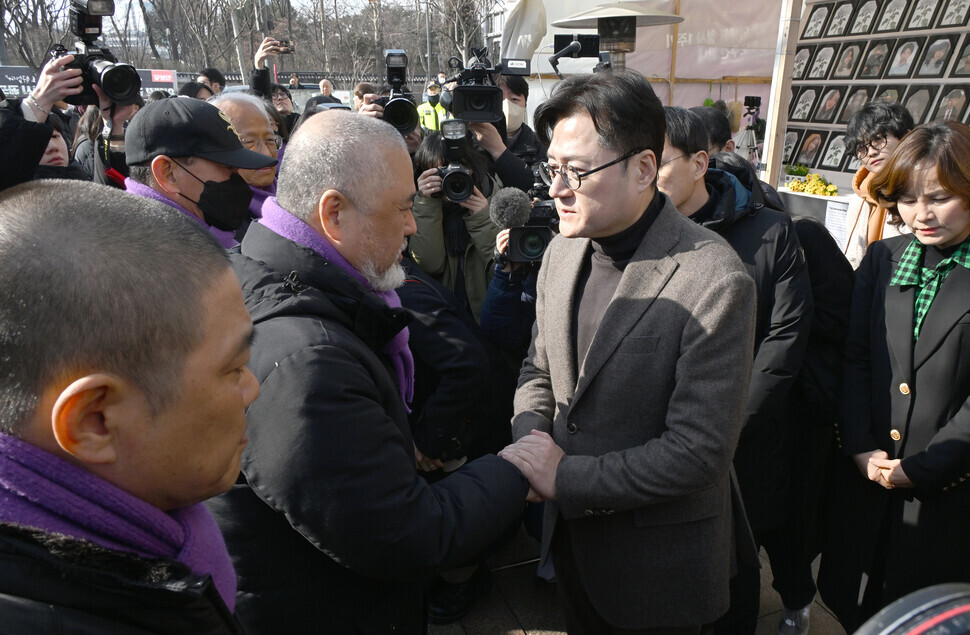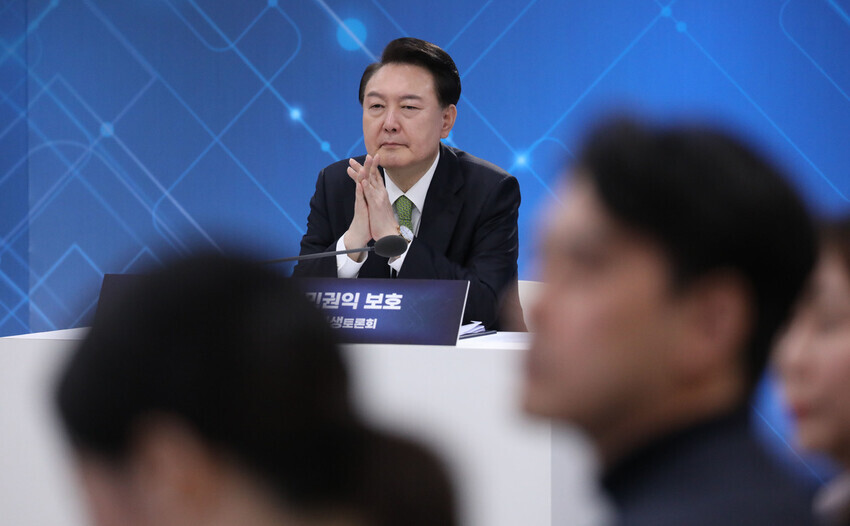hankyoreh
Links to other country sites 다른 나라 사이트 링크
Vetoing ninth bill of term, Yoon dooms prospects of investigating Itaewon disaster

On Tuesday, President Yoon Suk-yeol vetoed a special bill that would have launched a renewed investigation into the 2022 crowd crush that left 159 dead in Seoul’s Itaewon. Yoon has vetoed a total of nine bills thus far, the most vetoes exercised by any Korean president since Roh Tae-woo. The bill now returns to the National Assembly, but with slim chances of party compromise, it will likely die in the legislature.
In a statement released on Tuesday afternoon, the presidential office announced that Yoon had exercised his right to have the special bill for ensuring the rights of victims, uncovering the truth, and preventing future tragedies regarding the Oct. 29 Itaewon tragedy sent back to the National Assembly for reconsideration following a recommendation passed by his Cabinet that morning.
The bill, which would have formed a committee to investigate the circumstances that led to the tragedy and the failed response to it, was passed by the National Assembly on Jan. 9, thanks in large to efforts by the Democratic Party and other minor opposition parties. The bill was then relayed to the Yoon administration on Jan. 19. Just 11 days later, Yoon vetoed the bill.
To overturn Yoon’s veto, the majority of the National Assembly must be present. A two-thirds majority then must vote to overturn the veto. Considering that the People Power Party, which holds 112 parliamentary seats out of a total 298 on the register as of Monday, openly opposes the bill, there’s little optimism that it will be sent back to the executive branch.
On Jan. 5, Yoon vetoed a pair of special bills. One would have mandated an investigation into allegations that the first lady partook in stock manipulation; the other mandated an investigation into a corruption scandal known as the “Daejang 5 billion won club,” a group of people who allegedly received bribes for a land development project in Seongnam, Gyeonggi Province. That makes his latest veto his third in 25 days.
The day before the bill was vetoed, bereaved family members of the Itaewon victims took part in a Buddhist procession of bowing and marching in front of the presidential office to demand that Yoon approve the bill. Yoon turned a blind eye to their demands, insisting that signing off on the bill would only further divide the country.

On Tuesday morning, Prime Minister Han Duck-soo presided over a Cabinet meeting at the central government complex in Seoul where the government ministers passed a motion to recommend the bill be vetoed. In his opening remarks, Han declared, “The great authority bestowed by the bill grants investigators the right to conduct searches and seizures without warrants, and contains the potential to excessively violate the basic rights of citizens.” With that, the administration requested that the ruling and opposition camps renew their discussion of the bill in the legislature.
Likely aware there would be public blowback to the veto, the Yoon administration has put forth what it’s called a “comprehensive package of aid measures” for those affected by the disaster, including providing bereaved family members financial compensation, subsidies for medical and nursing costs incurred due to the disaster, economic incentives that would benefit the Itaewon area, a proposal to build a memorial honoring the victims, and the formation of an official government committee under the prime minister for managing financial compensation to bereaved family members.
But the administration drafted this package without consulting the victims or family members. It also excludes the most important demand by family members: a no-stone-unturned investigation into the causes of the disaster and the mishandled response.
Yoon’s opponents wasted no time in lambasting the veto.
Lee Jae-myung, who heads up the nation’s top opposition party, called the move an “official declaration of the Republic of Korea to be a land of shirked responsibility, a society in which it is each individual for themselves,” writing on Facebook.
“The president has abused the authority bestowed on him by the people by refusing their demands for an investigation into a social tragedy. What an insufferable president,” said Lim O-kyeong, the Democratic Party floor spokesperson.
“For attempting to downplay the government’s responsibility in the tragedy, for his arrogance and stubbornness, the day of judgment will come for President Yoon in the eyes of the Korean people,” she declared.
By Kim Mi-na, staff reporter; Shin Min-jung, staff reporter; Lee Woo-yun, staff reporter
Please direct questions or comments to [english@hani.co.kr]

Editorial・opinion
![[Column] How opposing war became a far-right policy [Column] How opposing war became a far-right policy](https://flexible.img.hani.co.kr/flexible/normal/500/300/imgdb/original/2024/0702/5017199091002075.jpg) [Column] How opposing war became a far-right policy
[Column] How opposing war became a far-right policy![[Editorial] Korea needs to adjust diplomatic course in preparation for a Trump comeback [Editorial] Korea needs to adjust diplomatic course in preparation for a Trump comeback](https://flexible.img.hani.co.kr/flexible/normal/500/300/imgdb/original/2024/0702/9717199086060096.jpg) [Editorial] Korea needs to adjust diplomatic course in preparation for a Trump comeback
[Editorial] Korea needs to adjust diplomatic course in preparation for a Trump comeback- [Editorial] Silence won’t save Yoon
- [Column] The miscalculations that started the Korean War mustn’t be repeated
- [Correspondent’s column] China-Europe relations tested once more by EV war
- [Correspondent’s column] Who really created the new ‘axis of evil’?
- [Editorial] Exploiting foreign domestic workers won’t solve Korea’s birth rate problem
- [Column] Kim and Putin’s new world order
- [Editorial] Workplace hazards can be prevented — why weren’t they this time?
- [Editorial] Seoul failed to use diplomacy with Moscow — now it’s resorting to threats
Most viewed articles
- 110 days of torture: Korean mental patient’s restraints only removed after death
- 2[Editorial] Korea needs to adjust diplomatic course in preparation for a Trump comeback
- 3Nine dead in Seoul after car plows into pedestrians
- 4[Column] How opposing war became a far-right policy
- 5Korea to create dedicated population strategy ministry to combat low birth rate, aging society
- 6Samsung Electronics workers to go on first strike in company’s 55-year history
- 7Son Heung-min’s father, brother accused of child abuse at football academy
- 8[Editorial] Silence won’t save Yoon
- 9Japan is building a military meant for more than self-defense — and has the US to thank for it
- 10Dreams of a better life brought them to Korea — then a tragic fire tore them apart